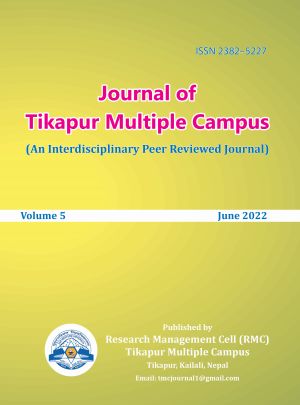Agriculture and Forestry Education in Nepali Universities: A Conscientious Review
DOI:
https://doi.org/10.3126/jotmc.v5i1.46521Keywords:
Agriculture and Forestry Graduate Education, Nepal, Plans and Policies, SWOT, UniversitiesAbstract
There is an uncontested view that higher education contributes to overall development of the nation, while higher technical education contributes to the deployment to the citizens. In consideration of the importance of natural resources as the means of national development, and for their conservation, promotion, preservation and proper utilization through the education, the Government of Nepal (GoN) established the formal system of agriculture and forestry education in 1960-1970’s, which now has been spread throughout the country by the name of different academic institutes and national universities. This report conscientiously analyzed the past and present attempts of academic developments of higher level agriculture and forest education in Nepal and draws the attention to be taken in action by different stakeholders for the expansion and betterment of the current challenges and problems of higher level agriculture and forest education with SWOT analysis. The review specifically points out at the higher level of agricultural and forest education structure, analyzes the critical problems and offers several recommendations to build capacity of the higher level agriculture and forest education systems in Nepal for next steps. The academics, research and extension being vital for the prosperity of the educational institutes, the academic institutions are advocated to establish the innovative collaboration and long-term research relationships with diverse national and international organizations after linking with agriculture and forest based industries, and finally suggesting for increasing the involvement of students in action research works with concrete strategic plans and programs. For the overall development of the provincial republican country, the financial self-sustainability of the technical institutions is not only the concern, but it needs to provide synergy in several paradigms with the non-technical faculties of the different Nepalese universities. It is also advised that the Agriculture and Forest Councils in the country must be established at the prompt to regulate the quality, quantity and job opportunity of the agriculture and forest graduates.
Downloads
Downloads
Published
How to Cite
Issue
Section
License
Copyright (c) 2022 Lal Prasad Amgain

This work is licensed under a Creative Commons Attribution-NonCommercial 4.0 International License.
This license enables reusers to distribute, remix, adapt, and build upon the material in any medium or format, so long as attribution is given to the creator. The license allows for commercial use.




